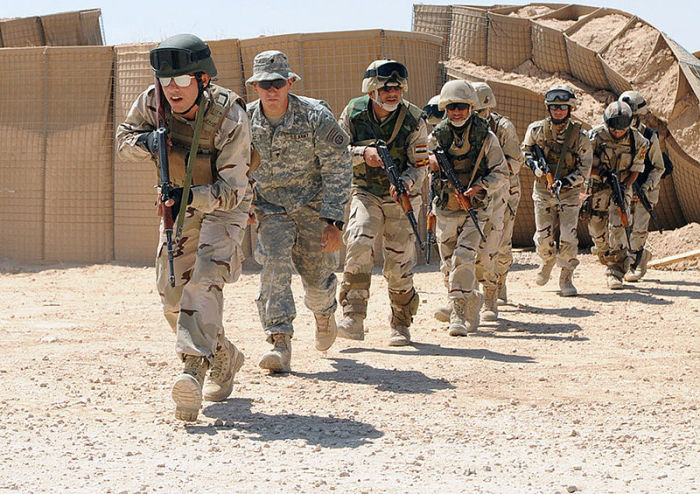Iraqi Soldier Turned Baghdad Cab Driver Reveals How Iraq's 50,000 Ghost Soldiers Operate Their Scam

An Iraqi man who claims to be one of the 50,000 "ghost soldiers" on the Iraqi military's payroll, revealed over the weekend that corrupt superior officers within the Iraqi military are allowing soldiers, who have failed to report for duty, to stay on the military's payroll in exchange for a portion of their salary.
Thirty-eight-year-old Mazin, who works full time as a cab driver in Baghdad while collecting a monthly salary from the Iraqi army, said in an interview with NBC News that he made an agreement with an Iraqi superior officer in 2009 to give up half of his own monthly salary (about $950) to the superior officer in exchange for not having to report for duty anymore and still remaining on the payroll.
"The officer used to call me every month to receive my salary and give him his share," Mazin said. "He used to call me whenever we needed, for example, to renew our identification cards."
After an investigation into Iraq's military corruption began shortly after the country's new prime minister, Haider al-Abadi, took office in September, it was discovered that about 30 percent of Iraqi military ranks, about 50,000 soldiers, were not reporting for duty yet still being paid.
"Those 50,000 soldiers were revealed after an intense search through military documents and there will be a field search in order to put an end to this phenomenon and any other form of corruption," Abadi's spokesman, Rafid Jaburi, said.
Prominent Iraqi lawmakers have blamed "ghost soldiers" and other forms of military corruption for being the major reason why the Iraqi army was all but helpless to prevent the siege by the Islamic State over the summer, despite the billions of United States dollars invested in helping train Iraqi soldiers to defend against radical extremist groups.
Mazin said that being a ghost soldier while holding down another job was the sure way for him to get the money he needed.
"The reason behind doing this is that I have a family I need to take care of and two kids in school," Mazin said. "Besides, I have to pay for rent and other expenses. I found that this is the only way to earn more money, besides securing my future when I retire."
A anonymous senior source within the Iraqi Ministry of Defense told NBC that the military's corruption goes beyond just the initial superior officer who collects the funds. The source said that the officers often divide their share of the soldier's pay and then pass the rest of the money to officers at a higher ranking level.
"We as officers, as well as normal soldiers, all knew that the army was filled with what we call 'spaceman soldiers' but no one dared to take about it," the source said.
Abadi vowed at the end of November to put an end to the military's corruption. Following up on his vow, Abadi has dismissed at least 36 military officers that he has accused of corruption.
Although Abadi wants to eliminate the corruption, corruption runs too thick in the Iraqi military to be ousted just by getting rid of a few dozen generals, Iraqi Shiite lawmaker Amer Tau'ma, who is also on the nation's defense committee, said.
"Only a few of the top officers have no corruption," Tau'ma said.
A Baghdadi police captain told NBC that many of the "ghost soldiers" are closely related to top military officers.
"Most of those ghost elements of the Ministry of Interior are sons, relatives, guards of senior officers," the police officer said.
Although the corruption runs deep in the military, Abadi will not be deterred from fixing the problem. NBC reports that a senior source in the Iraqi Ministry of Defense is claiming that new regulations have been put in place requiring several different officers to sign off on a soldier's paycheck.
"I do not know what is going to happen next," Mazin said. "I talked over the phone to my officer. He told me that he thinks I will have to go back to normal service, but he does not know when."




























